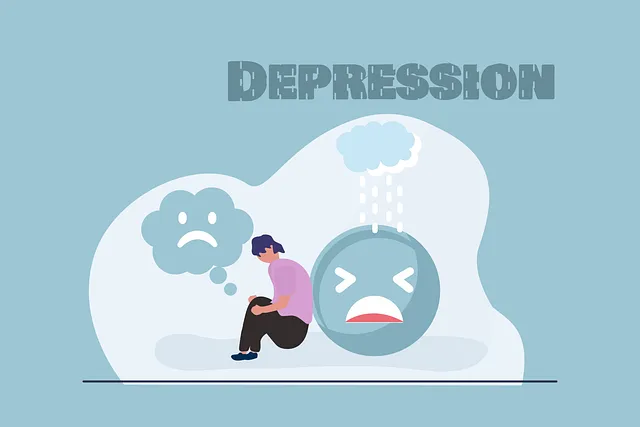Arvada Kaiser Permanente tackles mental illness stigma through comprehensive mental health coverage, offering crisis intervention, risk management planning, and education. Their initiatives, like the Mental Wellness Podcast Series and Inner Strength Development programs, normalize conversations, empower individuals to recognize mental health struggles, and reduce societal barriers. Through community workshops, seminars, and assessments, they evaluate and improve their stigma reduction efforts, transforming mental healthcare accessibility and perception in their communities.
Stigma surrounding mental illness persists, impacting millions. This article explores strategic efforts to reduce this societal burden, focusing on healthcare provider involvement, innovative models like Arvada Kaiser Permanente’s mental health coverage, community education, and evaluation methods. By understanding the causes of stigma and its profound effects, we can foster an environment that prioritizes mental well-being for all. Additionally, examining successful initiatives like Arvada Kaiser Permanente’s approach offers valuable insights into enhancing accessibility and support.
- Understanding Mental Illness Stigma: Causes and Impact
- The Role of Healthcare Providers in Stigma Reduction
- Arvada Kaiser Permanente's Approach to Mental Health Coverage
- Community Education and Engagement Strategies
- Measuring Success: Evaluating Stigma Reduction Efforts
Understanding Mental Illness Stigma: Causes and Impact

Mental illness stigma is a pervasive issue that often prevents individuals from seeking help and support. It arises from various sources, including misinformation, fear, and societal norms. This misconception can be deeply damaging, leading to isolation, discrimination, and even exacerbation of symptoms for those affected by mental health conditions. The impact extends beyond the individual, creating a broader societal barrier to accessing quality mental healthcare.
In Arvada, Kaiser Permanente offers comprehensive mental health coverage designed to combat this stigma. Their services include crisis intervention guidance, risk management planning for mental health professionals, and effective communication strategies that prioritize patient care and understanding. By promoting awareness and providing accessible resources, organizations like Kaiser Permanente play a crucial role in reducing the stigma surrounding mental illness, fostering an environment where individuals can openly discuss their struggles and receive the necessary support.
The Role of Healthcare Providers in Stigma Reduction

Healthcare providers play a pivotal role in stigma reduction efforts surrounding mental illness. They have the unique opportunity to challenge stereotypes and educate both themselves and their patients through Arvada Kaiser Permanente mental health coverage initiatives, ensuring comprehensive care and support. By integrating Mental Health Policy Analysis and Advocacy into their practices, healthcare professionals can promote policies that reduce barriers to treatment and encourage early intervention. This includes advocating for improved access to mental wellness resources, such as the Inner Strength Development programs, which empower individuals to navigate challenges with resilience and self-care.
Moreover, healthcare providers can contribute to stigma reduction by normalizing conversations about mental health through the Mental Wellness Podcast Series Production. Sharing relatable stories and expert insights can help break down misconceptions and foster a culture of understanding and empathy. By actively engaging in these initiatives, healthcare providers not only support individual healing but also contribute to a broader societal shift towards accepting and supporting individuals with mental illness.
Arvada Kaiser Permanente's Approach to Mental Health Coverage

Arvada Kaiser Permanente has taken significant strides to address mental health issues by offering comprehensive mental health coverage as an integral part of their healthcare services. This approach recognizes that mental wellness is a vital aspect of overall health and well-being. By prioritizing mental health, Arvada Kaiser Permanente aims to reduce the stigma associated with seeking support for psychological and emotional challenges. Their insurance plans provide access to a wide range of mental health professionals, including therapists, counselors, and psychiatrists, ensuring patients have the necessary resources for assessment, treatment, and recovery.
The organization’s commitment extends beyond coverage; they actively promote community education and awareness about mental wellness and trauma support services. This includes initiatives aimed at empowering individuals to recognize when they or their loved ones might be struggling with a mental health condition. Additionally, Arvada Kaiser Permanente encourages professionals in the field of mental health to implement robust risk management planning, ensuring a safe and supportive environment for both patients and practitioners.
Community Education and Engagement Strategies

In reducing the stigma surrounding mental illness, Community Education and Engagement Strategies play a pivotal role. Organizations like Arvada Kaiser Permanente are at the forefront, offering comprehensive mental health coverage that includes services such as Self-Awareness Exercises and Trauma Support Services. By organizing workshops, seminars, and community conversations, these initiatives foster open dialogue about mental health challenges and dispel myths prevalent in society. This approach not only educates individuals but also promotes empathy and understanding, creating a more inclusive environment for those struggling with their mental well-being.
The strategies often involve encouraging Resilience Building through various programs tailored to different age groups and communities. By equipping people with the knowledge and tools to recognize and support each other, these efforts aim to break down barriers and reduce the isolation that many individuals with mental illness experience. Through such inclusive practices, Arvada Kaiser Permanente and similar organizations are revolutionizing mental health care accessibility and perception in their communities.
Measuring Success: Evaluating Stigma Reduction Efforts

Evaluating the success of stigma reduction efforts is a critical aspect of understanding their impact and guiding future initiatives. Measuring progress often involves quantitative and qualitative assessments to capture changes in public perceptions, attitudes, and behaviors related to mental illness. One effective method is conducting surveys before and after intervention programs to track shifts in stigmatizing beliefs and sentiments. These surveys can assess knowledge about mental health conditions, comfort levels when interacting with individuals living with these challenges, and willingness to seek help or offer support.
For instance, the Community Outreach Program Implementation at Arvada Kaiser Permanente has utilized such evaluation techniques. Their efforts include educational workshops, peer support groups, and Mindfulness Meditation sessions aimed at fostering empathy building strategies. By measuring attendance, participant feedback, and follow-up surveys, the program can quantify changes in attitudes towards mental health. Such data provides valuable insights into which components of the program are most effective and where improvements might be needed to ensure continued success in reducing mental illness stigma within the community.
Mental illness stigma reduction is a multifaceted effort that requires the involvement of healthcare providers, community engagement, and innovative programs like those offered by Arvada Kaiser Permanente through its comprehensive mental health coverage. By addressing the root causes of stigma and implementing effective education strategies, we can create a more inclusive society where individuals with mental health conditions are supported rather than shamed. Continuous evaluation of these efforts ensures that progress is made and that services remain impactful, ultimately fostering a better understanding and reduced stigma around mental illness.






